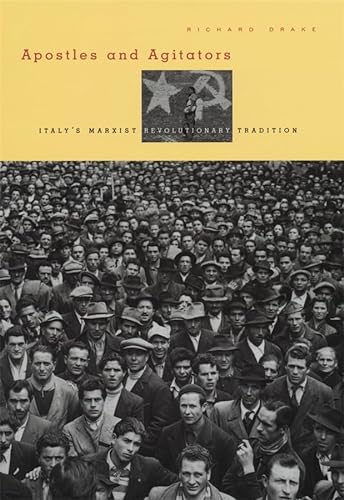Críticas:
This fascinating book deals with Italy's Marxist revolutionaries who adopted and updated Guiseppe Garibaldi's 1860 war cry 'Qui si fa l'Italia o si muore' ('Here we make Italy--or die'). -- Arnold Beichman Washington Times 20030831 Drake, who teaches at the University of Montana, is already responsible for one of the two best books on the Moro case. In Apostles and Agitators he has an unmistakable, but unacknowledged model: Edmund Wilson's majestic To the Finland Station. Each book relates the thought of the important figures in the Marxist tradition to the lives and situations of those figures. Drake's analysis confirms that for much of two centuries, the revolutionary Left has expended the majority of its energy and its venom in its ongoing war against the moderate reformers ("revisionists") of its own faith. Wilson would be very proud of this valuable book. -- Stanton Burnett USItalia From the late 19th century through at least half of the 20th, Europe's socialist and communist parties and multiple radical groups drew inspiration and guidance from Marx's revolutionary philosophy. Advocates of violence as well as partisans of reform though existing political systems shared much of this common source and ultimate goal. While differing interpretations of Marx frequently yielded splintering and antagonisms, the revolutionary traditions in each country were shaped more by national conditions than by ideological differences. Nowhere was this truer than in Italy, where violence was embraced by successive generations on the Left. Drake explores the path that led to outbursts of terror and murder attributed to the 'Red Brigades' from 1969 to 1984. Succinct and comprehensive intellectual portraits of leading contributors to Italy's revolutionary tradition from the 1870s forward demonstrate the persistent appeal of direct revolutionary action. Remarkable figures all, several stand out and are described and analyzed brilliantly: Arturo Labriola, Benito Mussolini (a leading socialist until 1915), Antonio Gramsci, and Palmiro Togliatti. Key themes are followed throughout so that these portraits, taken together, offer rich understanding of a preference, even a passion, for violence on the Italian Left. -- N. Greene Choice 20040301 Drake illustrates the overarching, ideological resoluteness of his protagonists and respectively explains why each of their revolutionary programs failed. Drake is particularly effective in the essay on Mussolini where he convincingly explains that his 'ideological eclecticism' made it possible to switch from socialism to nationalism in a seamless manner. Drake is as informative when he places Gramsci's historical significance into the context of reality. Rightly, he points out that Gramsci was a dogmatic follower of the Communist International who misinterpreted the Italian Risorgimento and who, finally, politically underestimated the rise of Fascism...Without question, as Drake points out, this 'complex culture of violence' dominated the Red Brigades in the seventies and eighties. Hence, Marx's revolutionary theory in Italy ended as a blind, brutal, and murderous phenomenon. -- Wolfgang Schieder Frankfurter Allgemeine Zeitung Drake uses biography to relate the ideas of his chosen protagonists to those of other European intellectual/political leaders, and to shed light on the relevant periods. The chapters on [Carlo] Cafiero and Antonio Labriola, useful introductions to these little-known individuals, bring out both the contested nature of the Italian reception of Marx from the beginning and the difficulty of establishing a mainstream and sophisticated Marxism...[The] chapter on Mussolini is a lively and persuasive account of his transition from being an important leader of revolutionary socialists, until his expulsion from the socialist party in 1914, to being the architect of his nationalist/fascist programme. Drake's treatments of Bordiga and the early Gramsci are well worth reading, particularly the account of Bordiga, where his ideological links with the Trotskyists are made unusually clear. -- Gino Bedani Journal of Modern Italian Studies Drake offers an invaluable genealogy of Marxist thinkers and demonstrates how Marx and Marxism--far from being a monolithic ideology--were adapted to Italian political, economic, and cultural realities on the ground. In Drake's reading, Mussolini and the forgotten Amadeo Bordiga both come off as more sincere than does Gramsci. This challenge to the usual saintly portrait of Gramsci is welcome, as Drake is honest in both his criticism and praise. It is indeed a formidable cast of characters, but Drake does not neglect non-Marxist thinkers such as Filippo Turati (the grand old man of Italian socialism), Karl Kautsky, Eduard Bernstein, Vilfredo Pareto, and Georges Sorel. -- Stanislao G. Pugliese Journal of Modern History
Reseña del editor:
One of the most controversial questions in Italy today concerns the origins of the political terror that ravaged the country from 1969 and 1984, when the Red Brigades, a Marxist revolutionary organization, intimidated, maimed and murdered on a wide scale. In this study of the ways in which an ideology of terror becomes rooted in society, Richard Drake explains the historical character of the revolutionary tradition to which so many ordinary Italians professed allegiance, examining its origins and internal tensions, the men who shaped it, and its impact and legacy in Italy. He illuminates the defining figures who grounded the revolutionary tradition, including Carlo Cafiero, Antonio Labriola, Benito Mussolini and Antonio Gramsci, and explores: the connections between the social disasters of Italy, particularly in the south, and the country's intellectual politics; the brand of "anarchist communism" that surfaced; and the role of violence in the ideology. Though arising from a legitimate sense of moral outrage at desperate conditions, the ideology failed to find the political institutions and ethical values that would end inequalities created by capitalism. In a chilling coda, Drake recounts the murders of the economists Massimo D'Antona and Marco Biagi by the new Red Brigades, whose internet justification for the killings is steeped in the Marxist revolutionary tradition.
„Über diesen Titel“ kann sich auf eine andere Ausgabe dieses Titels beziehen.


